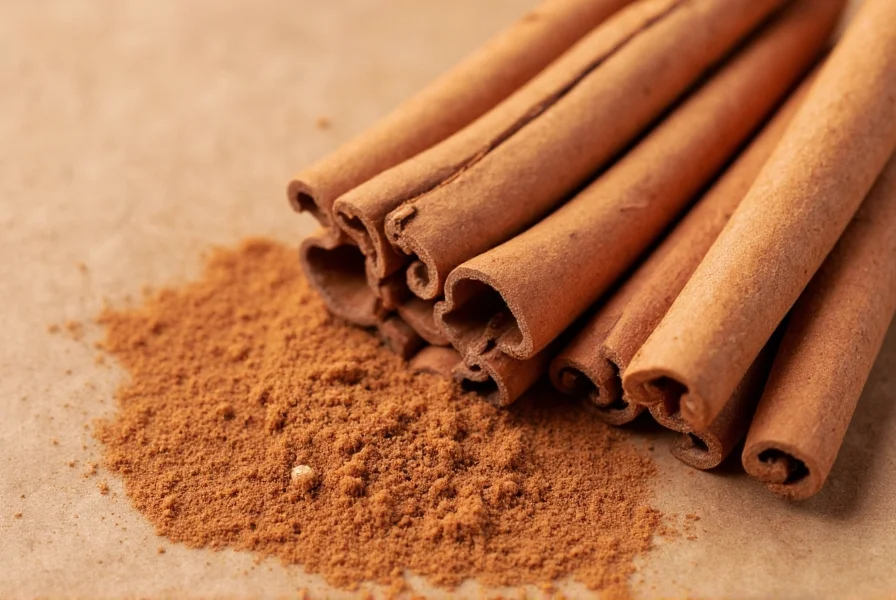Cinnamon has been prized for thousands of years, not just as a culinary spice but for its potential health-promoting properties. This fragrant bark from Cinnamomum trees contains numerous bioactive compounds that interact with our physiology in meaningful ways. While not a miracle cure, emerging research reveals specific health areas where cinnamon shows genuine promise.
Understanding Cinnamon Varieties
Not all cinnamon delivers the same health profile. The two primary types available commercially differ significantly in composition and safety:
| Type | Scientific Name | Key Characteristics | Health Considerations |
|---|---|---|---|
| Ceylon Cinnamon | Cinnamomum verum | "True" cinnamon, lighter color, delicate flavor, multiple thin layers | Lower coumarin content, safer for regular consumption |
| Cassia Cinnamon | Cinnamomum cassia | Most common commercial type, darker, stronger flavor, single thick layer | Higher coumarin levels, potential liver concerns with excessive consumption |

Scientifically Supported Health Benefits of Cinnamon
Blood Sugar Regulation
One of cinnamon's most researched benefits relates to health benefits of cinnamon for blood sugar management. Multiple studies indicate cinnamon may improve insulin sensitivity and lower blood glucose levels. A comprehensive review published in the Journal of Medicinal Food found that cinnamon supplementation significantly reduced fasting blood glucose in people with type 2 diabetes. The mechanism appears related to cinnamon's ability to mimic insulin and enhance glucose uptake by cells.
However, research shows blood sugar effects of cinnamon vary between individuals. While some studies report up to a 29% reduction in blood sugar levels, others show more modest effects. The American Diabetes Association doesn't currently recommend cinnamon as a standard treatment, but acknowledges it may provide complementary benefits when used alongside conventional approaches.
Powerful Antioxidant Properties
Cinnamon ranks exceptionally high on the ORAC (Oxygen Radical Absorbance Capacity) scale, which measures a food's antioxidant capacity. Its cinnamon antioxidant properties come primarily from polyphenols that combat oxidative stress—a key factor in aging and many chronic diseases. Research in Oxidative Medicine and Cellular Longevity identified cinnamon as having the fourth highest antioxidant capacity among 26 spices studied.
These antioxidants may contribute to cinnamon's potential protective effects against neurodegenerative conditions. Studies suggest cinnamon compounds might inhibit tau protein aggregation, a hallmark of Alzheimer's disease, though human research remains limited.
Anti-Inflammatory Effects
Chronic inflammation contributes to numerous health conditions, and cinnamon demonstrates notable cinnamon anti-inflammatory effects. The compound cinnamaldehyde appears responsible for much of this activity. Research published in Food and Chemical Toxicology showed cinnamon extract significantly reduced inflammatory markers in laboratory studies.
While human trials are still developing, these anti-inflammatory properties may explain why traditional medicine systems have used cinnamon for centuries to address inflammatory conditions. The effects appear most pronounced with regular, moderate consumption rather than occasional use.
Heart Health Potential
Emerging evidence suggests cinnamon for heart health may be promising. Several studies indicate cinnamon consumption can positively affect multiple heart disease risk factors. Research in the American Journal of Clinical Nutrition found that 120-180 mg of cinnamon daily reduced triglycerides, LDL cholesterol, and total cholesterol in people with type 2 diabetes.
Additional research suggests cinnamon may help lower blood pressure, though the effects appear modest. The combination of these cardiovascular benefits makes cinnamon a potentially valuable dietary component for heart health, particularly when incorporated as part of an overall heart-healthy eating pattern.
Practical Considerations for Cinnamon Consumption
Recommended Dosage and Safety
Understanding how much cinnamon should I consume daily is crucial for maximizing benefits while minimizing risks. Most studies showing health benefits used doses between 1-6 grams (approximately 0.5-2 teaspoons) daily. However, the safe upper limit depends on the cinnamon type:
- Ceylon cinnamon: Generally safe up to 1-1.5 teaspoons (2.5-4 grams) daily
- Cassia cinnamon: Limit to 0.5-1 teaspoon (1-2 grams) daily due to higher coumarin content
Coumarin, found in higher concentrations in Cassia cinnamon, can cause liver damage in sensitive individuals when consumed in excess. The European Food Safety Authority recommends a maximum daily coumarin intake of 0.1 mg per kilogram of body weight.
Who Should Exercise Caution
Certain populations should moderate or avoid cinnamon consumption:
- People with liver conditions should consult their physician before regular cinnamon use
- Those taking diabetes medications should monitor blood sugar closely, as cinnamon may enhance medication effects
- Pregnant women should avoid medicinal doses, though culinary amounts are generally safe
- Individuals scheduled for surgery should stop high-dose cinnamon consumption at least two weeks beforehand due to potential blood sugar effects
Incorporating Cinnamon Into Your Diet
You don't need supplements to enjoy health benefits of cinnamon in daily diet. Simple dietary additions can provide meaningful amounts:
- Add 1/2 teaspoon to morning coffee, tea, or smoothies
- Sprinkle on oatmeal, yogurt, or fruit
- Use in place of sugar in baked goods (reduces overall sugar content)
- Include in savory dishes like curries and stews
- Make cinnamon tea by steeping sticks in hot water

Limitations of Current Research
While promising, it's important to recognize the limitations of cinnamon health research. Many studies have been conducted in test tubes or on animals, with fewer high-quality human trials. Sample sizes in human studies are often small, and research durations typically short. Most evidence supports cinnamon as a complementary approach rather than a standalone treatment.
The difference between ceylon and cassia cinnamon in research outcomes also complicates interpretation, as many studies don't specify which type was used. Future research with larger human trials, longer durations, and clear cinnamon type specifications will provide more definitive guidance.
Conclusion
Cinnamon offers several evidence-supported health benefits, particularly for blood sugar regulation, antioxidant protection, and inflammation reduction. The health benefits of cinnamon for you depend on the type you choose, your consumption amount, and your individual health status. Ceylon cinnamon generally provides the best risk-benefit profile for regular use. While not a replacement for medical treatment, incorporating moderate amounts of quality cinnamon into a balanced diet represents a flavorful way to potentially enhance your health regimen. As with any dietary change, consult your healthcare provider if you have specific health conditions or concerns.










 浙公网安备
33010002000092号
浙公网安备
33010002000092号 浙B2-20120091-4
浙B2-20120091-4